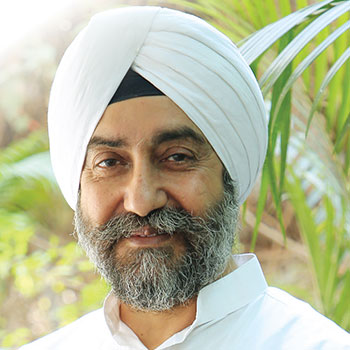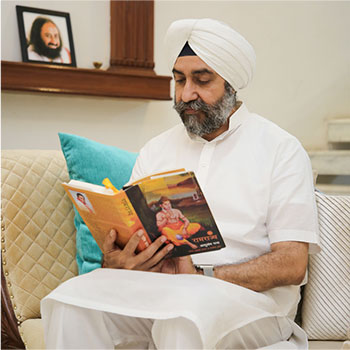Weathering Life’s Tempests

Globally travelled and an inspiring trainer of the Art of Living course; Sri Balvinder Chandiok, gives an insight into the importance of Sudarshan Kriya and the art of living a happy personal and professional life
Corporate Citizen: Take us through your journey with Art of Living.
Sri Balvinder Chandiok: In 1996, I visited our Chartered Accountant (CA) firm's office on MG Road, Pune, as my father was ill. My uncle who was there, asked me, “What are your plans for this evening?” I replied casually, "Nothing out of the ordinary, perhaps I'll spend the evening reading a book." To my surprise, he suggested, "There's a wonderful spiritual course taking place near your location; why not give it a try?”
Initially hesitant, I expressed my doubts about the course. My uncle reassured me, saying, "For 25 years, your father has entrusted me with managing his finances. Surely, you can trust my recommendation for something as small as this." With his words echoing in my mind, I returned home, intrigued by the idea. After some introspection, I decided to enroll in the course.
Upon arriving at the venue, I was greeted by the serene image of Guruji Sri Sri Ravi Shankar. However, it was the presence of a 23-year-old IIT engineer, adorned with a captivating smile, that truly caught my attention. Learning that he was employed at Infosys, I felt compelled to observe and see where this journey would lead. And so, it was through this chance encounter that I embarked on my first Art of Living course in Pune.
CC: How was your first day at the Art of Living course?
Although I had never felt drawn to meditation before, I found myself thoroughly enjoying the experience. Initially unsure of what to expect, I followed the simple instructions given to me to close my eyes and sit down. To my surprise, I felt a profound sense of well-being wash over me.
However, that night, typical of an entrepreneur, my mind was abuzz with thoughts of business growth, inevitably affecting the quality of my sleep.
The following morning, upon waking up feeling remarkably refreshed, I made the decision to complete the Sudarshan Kriya course. It proved to be an intensely emotional journey. Subsequently, I found a sense of peace and began practicing the kriya regularly. Over the course of a couple of months, those around me began to notice a positive change in my demeanour.
CC: Your first meeting with Sri Sri Ravi Shankar.
My parents, started noticing the transformation. In a way, being the only son, I was pampered, and everyone started noticing a positive change.
So in July, I completed my course, after which my teacher said, “If the first course was good, the advanced one would be an amazing bliss for you. Just go.” And in September, I went for the advanced course as well.
Later, Guruji arrived in Pune in November for a public lecture. He had come to a public hall in Pune. My parents met him but I stayed back in the parking lot, but then he called me in. Reluctantly, I went in, and to my surprise, he called me up on the stage. I was getting more sceptical, but he made me sit on the stage while he remained on the sofa . I was a little tense, and he just kept patting me on my back and then gave me a nice hug.
Thereafter, Guruji visited our home. He touched my shoulder and said to my parents, "Send him along with me." He then asked me when I would be coming. I replied, "Whenever you want." To my surprise, he said, "Okay, then come right away." So, I was a little shocked.
I visited the Bengaluru ashram in December for the advanced course and a teacher training programme. I met with a road accident on my way, but I managed to reach the location.
The next morning, he looked at me and asked, “You reached?” It was that look which conveyed that he knew about my accident. Surprisingly, I was untouched, without a scratch. He then asked me to participate in the teacher training programme. However, public speaking was not my thing. I preferred doing the advanced course and returning to contribute to other seva (selfless service). I couldn’t imagine talking in front of people. I am in awe of all the teachers, but I doubted my own abilities.
He insisted, saying, "No, you can do it." I responded, "Guruji, you don’t know me. This is only the second time we are meeting." Upon saying this, a group of people with him started laughing. It was much later I realised that I didn’t know myself, but he already knew what I was going to do. So that's how my journey began.
"Corporate training encompasses two crucial aspects, with leadership being one of the most pertinent and widely discussed. While some argue that leaders are born, the truth is that leadership extends beyond the confines of the workplace"
-Sri Balvinder Chandiok
CC: When did you go full-fledged as an Art of Living trainer?

By 2004, I had fully embraced the Art of Living philosophy. In 2001, I started travelling with Guruji to North India. I embarked on a new path of full time teaching. In 2004, an opportunity arose when I was asked to become a Corporate Trainer. Embracing this chance, I began travelling extensively with Guruji, fully immersing myself by 2005. Prior to the Silver Jubilee, I journeyed through several European countries, encouraging participation in the event. During this time, I conducted various programmes, established new centres, and wholeheartedly dedicated myself to the cause.
CC: What does Sudarshan Kriya do to a person?
The key lies in being at ease in your own skin. Embracing yourself fully, both in terms of who you are and how you are, while cultivating self-acceptance. It can be incredibly liberating. This inner comfort not only impacts you on a physical and mental level but also addresses underlying emotions, fostering a sense of tranquillity within. It moulds you into someone who navigates interactions and situations with greater ease. I'm not suggesting you won't encounter disturbances, but even amidst them, you'll sense a profound inner strength. Disturbances may linger on the surface, but they won't shake your core.
CC: In today's materialistic world, technology, particularly mobile phones, has significantly impacted the ability of youngsters to concentrate. What are your insights into the behaviour of the younger generation in light of these technological influences?
In our Indian culture, there's a concept known as Swadhyay, which involves observing one's internal state and understanding the thoughts of the mind. This process requires both time and a specific mental space.
In management terminology, this is referred to as self-referral. However, amidst the ongoing technological revolution and the constant engagement with social media, it seems we've somehow lost touch with this ability of self-observation. Consequently, many internal issues that could naturally resolve within us remain unaddressed. External opinions and ideas flood in, often contradicting our inner voice's guidance to simply let go. This influx of external thoughts clutters our minds, exacerbating the situation.
As this ability to observe ourselves declines, we find ourselves becoming more emotionally reactive individuals. Even minor incidents, such as encounters on the road, easily trigger feelings of aggression. This not only affects our external behaviour but also hampers our ability to rest and maintain overall physical health.
The consequence of this is often poor-quality sleep, creating a vicious cycle. I believe that social media and technology though useful to make life easier, have encroached upon the time we would otherwise dedicate to self-care, resulting in significant personal losses.
"It's important to recognise that leadership solely based on power tends to be transient. High attrition rates often occur when individuals find alternative opportunities offering slightly higher remuneration or reduced fear"
CC: What is the nature of your corporate training?

Corporate training encompasses two crucial aspects, with leadership being one of the most pertinent and widely discussed. While some argue that leaders are born, the truth is that leadership extends beyond the confines of the workplace. Even within small groups, such as family units, the way one behaves can influence the path taken by others. In essence, leadership involves the ability to influence even a modest group of individuals.
However, before leading others, one must first lead oneself. Understanding how to lead a fulfilling life is paramount to guiding others towards a positive existence. This concept entails two primary approaches. The first involves leading through the utilisation of power derived from one's position (Motivational) using greed and fear to drive performance. Holding a position of authority grants the ability to compel others to fulfil tasks, whether willingly or not.
Conversely, there exists another form of leadership based on personal influence (Inspirational). In this paradigm, individuals willingly choose to collaborate and align with a leader. This voluntary cooperation arises when individuals perceive their leader as someone who genuinely cares for their wellbeing, supports them, and is willing to make sacrifices for their benefit. When these qualities are evident in a leader, people are naturally inclined to listen to and follow them.
This phenomenon is exemplified by the leadership of Guruji, who hasn't mandated any performance and reward ratios. Instead, individuals voluntarily choose to contribute their best efforts. Understanding what motivates individuals to give their utmost is a crucial aspect of corporate leadership.
It's important to recognise that leadership solely based on power, tends to be transient. High attrition rates often occur when individuals find alternative opportunities offering slightly higher remuneration or reduced fear. Thus, effective leadership involves serving the genuine needs of individuals, aligning with the principles of servant leadership. Guruji's lifestyle serves as a testament to this approach, as he focuses on meeting the genuine needs of people rather than merely fulfilling their desires.
CC: What are your thoughts on oneself?
Over many years, I have realised that life is essentially a do-it-yourself project. You have to do everything on your own; you are independent, and you don't rely on other people. Having said that we are all interdependent, but in your mind, you are free of the expectations of dependency.
So, for that life to be lived, whether in company or at home, I am a karma yogi. This means I need to take actions continuously throughout the day to be self-reliant, and when these actions happen through an equanimous state, they bring out positive interactions.
CC: What is the philosophy of life that you lead by?
Through many years of experience, I've come to understand a fundamental truth: life can present challenges that are not always easy to accept. However, amidst these challenges, I've learned the importance of kindness. By extending kindness to others, we inadvertently nurture kindness within ourselves. This fosters a sense of contentment and peace, ultimately leading to a fulfilling and joyous existence.
CC: How would you describe present-day relationships and what should one do, to make them beautiful?
I feel that every relationship starts with love. It starts with feelings and various emotions. But when the feelings settle down, only two things can hold a relationship together—respect and trust. Feelings of love and affection will fade away over a period of time. But if you respect each other, if you have trust in each other and in your own ability, the relationship will endure for a prolonged period.